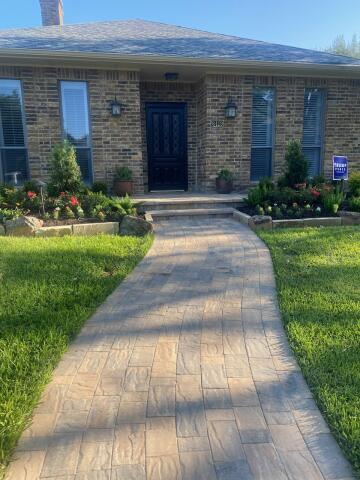Beauty and Versatility
Pavers come in various shapes, sizes, colors, and textures, allowing for creative and customized designs. This versatility enables homeowners to achieve a specific look that matches their landscaping and personal style.
Durability and Longevity
Pavers are typically made from strong materials like clay, brick, porcelain, or concrete that withstand heavy traffic, weather changes, and freeze-thaw cycles better than traditional concrete. They are less likely to crack over time.
Reduced Maintenance
Pavers, particularly if sealed properly, are resistant to stains and can be easier to clean. If a paver becomes damaged, it is often simpler and more cost-effective to replace just a single paver rather than having to repair or replace an entire concrete slab.
Flexibility and Drainage
Permeable pavers are installed in a way that allows for gaps between them, which can help with water drainage. This feature can reduce the risk of flooding and erosion and allows for water to permeate the ground, which is beneficial in managing stormwater. However, an open grade layered aggregate base system is required and is often designed by an engineer or a professional certified permeable hardscape installer.
Stability and Movement
Concrete can crack due to soil movement, temperature changes, and settling. Pavers can shift slightly without cracking, making them a more stable option for areas with unstable ground.
Ease of Repair and Replacement
If a paver gets damaged, it can be easily removed and then replaced without affecting surrounding units or requiring significant reconstruction. Conversely, repairing concrete often involves significant labor and cost.
Environmentally Friendly
Pavers can be made from recycled materials and are often considered to be more environmentally friendly. Additionally, the drainage capabilities of pavers can help maintain groundwater levels and reduce stormwater runoff. Pavers allow more water to be absorbed back into the soil.
Create Value
Pavers can enhance property value; their aesthetic appeal and functional benefits may make a home more attractive to potential buyers.
Paver installation
While both materials require professional installation for the best results, the installation of pavers often allows for a more adaptable layout, providing options like curves and intricate designs that can be harder to achieve with poured concrete.
Overall, while pavers are typically more expensive than laying a concrete slab initially, their long-term
benefits often outweigh the initial costs.

